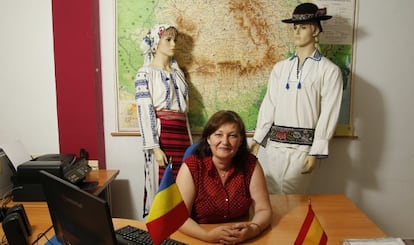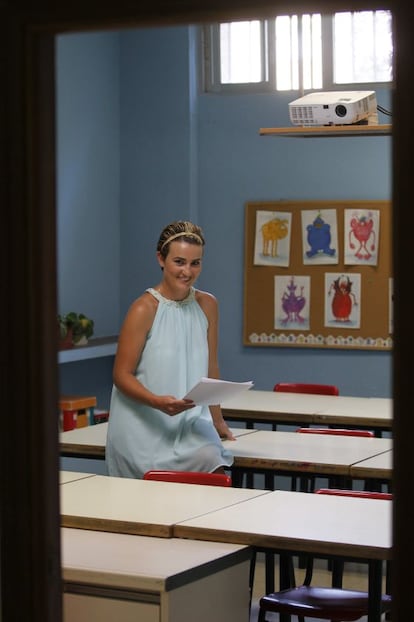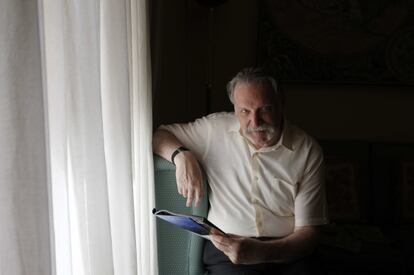The changing face of Romania
Immigrants from the Eastern European country are the Madrid region's largest foreign community Many are defying stereotypes and integrating into society

An uncomfortable silence descends on the room when a Romanian confesses to being a Romanian. For a few seconds, the other person quickly runs through his or her mental references about this nationality. "Ah, well, you don't look it!" is the typical answer after this particular Romanian has been compared with the Romanian Gypsies who steal copper wiring, the Romanian prostitutes on Madrid's Montera street and the Romanian pimps who play the slot machines all day long. Often enough, the conversation continues with a "I once had a Romanian house cleaner who..."
Romanians stand for begging, for mafias and for prostitution. They will themselves admit as much, but they also stand for much more than that. The 220,641 Romanian nationals registered in Madrid make up the largest foreign group in the region - far larger than the 87,077 resident Moroccans. Their desire to adapt is so strong that they often renounce much of their own culture, but without ever becoming fully Spanish: they are what they humorously refer to as rumañoles.
Many Romanians who emigrate are burdened with a disappointment"
The last Saturday in August was a busy one at 19, Wad-Ras street, in the north of the capital. Sitting outside the Federation of Romanian Associations of Spain, a man dressed in a white shirt with puffed sleeves and colorful embroidery smoked a cigarette. Inside were women in traditional dresses and trays of typical dishes. Romanians had come here from towns like Coslada and Alcalá de Henares to feel closer to home.
A Romanian folklore, tradition and customs workshop was about to start. The instructor, Ica Tomi, smiled nervously. Few people knew what she'd been through to get here. Tomi, 49, arrived in Madrid at age 40.

"Many Romanians who emigrate are burdened with a disappointment or a failure," she explained bitterly. Her own wood processing company went bust, and she moved to Madrid to work as a house cleaner to support her family. "It was a very hard experience. You go from one social status to another, you don't speak the language and nobody cares what you're like or what you think. But I would rather talk about my project."
Her project represents her comeback. As a young woman she was passionate about her country's folklore; later came the business venture, then the cleaning episode, and now she has found funding to do what she likes best. "I developed this project with older people in mind, but also for their children who were born here. Many refuse to speak Romanian at home in order to fit in at school. I wanted them to learn about the culture they come from."
The funding comes from the Department of Romanian Residents Abroad, which answers to the Romanian Foreign Ministry. There are nearly three million nationals living outside Romania's borders, the majority leaving after the fall of Communism in 1989. "Our goal is for Romanians not to lose their identity despite living abroad," explains Stejarel Olaru, the state secretary who heads this department, in a telephone conversation. But then he added that "the most important thing is for them to integrate into the society they live in." And for that, his department works in partnership with local authorities.
"There are mafias from Eastern Europe who project a very negative image, but the majority of Romanians who live in Madrid have very good integration levels," says Pablo Gómez-Tavira, director general of Spain's immigration department. To reach this conclusion, his department measures factors such as employment rates, mixed marriages and coexistence levels. According to regional barometers, the jobless rate among Romanians in Madrid is 28 percent. There are 55,400 registered nationals in the central district, although they are much more visible in peripheral municipalities like Alcalá de Henares (21,867), Coslada (18,602), Arganda del Rey (12,442) or Torrejón de Ardoz (10,727).
The Romanians I know here all work in the field of culture"
"The municipality of Coslada is a leading example of peaceful coexistence; 8.86 percent of the region's Romanians live there and there are no serious problems, quite the opposite in fact," says Gómez-Tavira. "Integration in the classroom is a fact, and there are areas such as science and math where Romanians stand out from the other students. Discrimination is more of an adult thing than something you see among kids."
Although a significant portion of Romanian immigrants are working class people from the countryside, the country also exports professionals and artists. Marian and Lavinia Moraru are two violinists aged 36 and 33 who have been playing with the symphony orchestra of Radio Televisión Española for the last six years. "There are lots of Romanians in Spanish orchestras because the training there is very good, especially in the string instruments," explains Marian Moraru, who also plays in a chamber music group and says he has never felt discriminated against. "The Romanians I know here all work in the field of culture."

"There is a very important intellectual elite in Romania; people still speak as many languages or more as they did in my childhood," says Adrian Mac Liman, who arrived in Spain in the 1970s from Switzerland, where his family had fled during the Communist regime. He has worked as a journalist for EL PAÍS and La Vanguardia, as a Washington correspondent and special correspondent in the Middle East. He speaks perfect Spanish and Romanian, and is also fluent in French, Portuguese, Russian, Arabic and Hebrew.
"The people who beg on the street are Romanians, but not all Romanians are like that, it's a very reductionist image," he says. "The problem is that sometimes a tree falling down makes more noise than an entire forest growing quietly."
Tu suscripción se está usando en otro dispositivo
¿Quieres añadir otro usuario a tu suscripción?
Si continúas leyendo en este dispositivo, no se podrá leer en el otro.
FlechaTu suscripción se está usando en otro dispositivo y solo puedes acceder a EL PAÍS desde un dispositivo a la vez.
Si quieres compartir tu cuenta, cambia tu suscripción a la modalidad Premium, así podrás añadir otro usuario. Cada uno accederá con su propia cuenta de email, lo que os permitirá personalizar vuestra experiencia en EL PAÍS.
¿Tienes una suscripción de empresa? Accede aquí para contratar más cuentas.
En el caso de no saber quién está usando tu cuenta, te recomendamos cambiar tu contraseña aquí.
Si decides continuar compartiendo tu cuenta, este mensaje se mostrará en tu dispositivo y en el de la otra persona que está usando tu cuenta de forma indefinida, afectando a tu experiencia de lectura. Puedes consultar aquí los términos y condiciones de la suscripción digital.








































